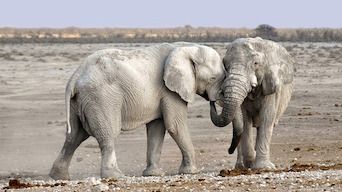Might Elephants Be the Key to Curing Cancer?
Elephants rarely get cancer due to a large amount of the p53 protein in their system, and this protein could be the answer that humans have been seeking for decades.

Theoretically, the more cells an organism has, the more likely that organism is to develop cancer. It stands to reason, then, that elephants would get cancer much more frequently than many other animals, including humans.
But that is not the case at all. Elephants, in fact, rarely get cancer.
Despite their huge size—they are almost 100 times larger than humans with 100 times as many cells in their bodies—the mortality rate for elephants with cancer is well under 5%. In humans, cancer-related mortality hovers around 20%.
Scientists now understand why, and it has everything to do with genes—specifically, the TP53 gene. TP53 codes for the protein P53, which prevents cancer formation in multicellular organisms by stopping cells with damaged DNA from dividing.
Elephants have 40 copies the of TP53 gene. Humans have just 2 copies, and those can undergo mutation relatively easily. (Studies have shown that TP53 is nonfunctional in more than 50% of human cancers.)
Pediatric oncologist Joshua Schiffman, MD, from the Huntsman Cancer Institute in Salt Lake City, Utah, believes that the significantly higher number of TP53 genes in elephants may ultimately lead to a cure for some cancers in animals and humans.
Dr. Schiffman and his team, which now includes Avi Schroeder, an assistant chemical engineering professor at Technion-Israel Institute of Technology, have developed a synthetic form of the P53 protein modeled after the elephant form (known as eP53).
When they introduced this synthetic P53 into human cancer cells in the laboratory, the cancer cells were annihilated.
“What we found is that the cancer cells are all dying very quickly when they’re exposed to this elephant cancer protein,” said Dr. Schiffman, adding that the finding “was probably one of the most thrilling experiences I’ve ever had in my career.”
The next step is to begin preclinical testing in mice and dogs. To do so, the investigators must manufacture p53 in nanoparticles that are about 1/1000th smaller than the width of human hair—small enough to allow the protein to penetrate cancerous cells. They also need to raise a few million dollars to pay for all the required trials and testing—something Dr. Schiffman believes can be accomplished in just 3 years.
Success in preclinical trials in animals with cancer may lead to a drug released for veterinary use.
“We have great interest from people who have dogs and pets at home with cancer,” Schroeder says. After these preliminary trials in animals, human testing would be the team’s next step.
Dr. Schiffman, who himself was diagnosed with Hodgkin lymphoma at age 15, said he believes that elephant p53 can have a major impact on human cancer cells. While he hasn’t found a cure for cancer with the protein just yet, Dr. Schiffman said, “I’m on a quest to get rid of cancer. I think we’re on the way and I think the elephants are going to lead us there.”